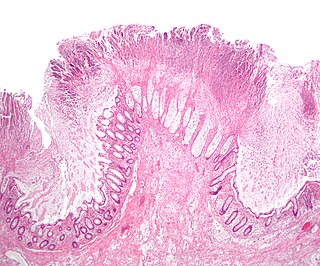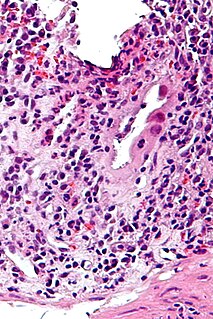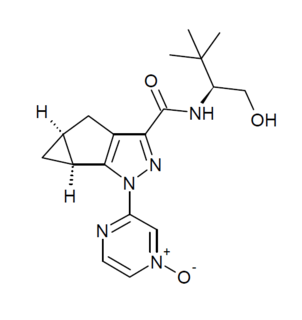Related Research Articles

Crohn's disease is a type of inflammatory bowel disease (IBD) that may affect any segment of the gastrointestinal tract from the mouth to the anus. Symptoms often include abdominal pain, diarrhea, fever, abdominal distension, and weight loss.

Ulcerative colitis (UC) is a long-term condition that results in inflammation and ulcers of the colon and rectum. The primary symptoms of active disease are abdominal pain and diarrhea mixed with blood. Weight loss, fever, and anemia may also occur. Often, symptoms come on slowly and can range from mild to severe. Symptoms typically occur intermittently with periods of no symptoms between flares. Complications may include abnormal dilation of the colon (megacolon), inflammation of the eye, joints, or liver, and colon cancer.

Hematochezia is the passage of fresh blood through the anus, usually in or with stools. The term is from Greek αἷμα ("blood") and χέζειν. Hematochezia is commonly associated with lower gastrointestinal bleeding, but may also occur from a brisk upper gastrointestinal bleed. The difference between hematochezia and rectorrhagia is that, in the latter, rectal bleeding is not associated with defecation; instead, it is associated with expulsion of fresh bright red blood without stools. The phrase bright red blood per rectum is associated with hematochezia and rectorrhagia.

Inflammatory bowel disease (IBD) is a group of inflammatory conditions of the colon and small intestine. Crohn's disease and ulcerative colitis are the principal types of inflammatory bowel disease. Crohn's disease affects the small intestine and large intestine, as well as the mouth, esophagus, stomach and the anus, whereas ulcerative colitis primarily affects the colon and the rectum.

Colitis is an inflammation of the colon. Colitis may be acute and self-limited or long-term. It broadly fits into the category of digestive diseases.

Toxic megacolon is an acute form of colonic distension. It is characterized by a very dilated colon (megacolon), accompanied by abdominal distension (bloating), and sometimes fever, abdominal pain, or shock.

Blood in stool looks different depending on how early it enters the digestive tract—and thus how much digestive action it has been exposed to—and how much there is. The term can refer either to melena, with a black appearance, typically originating from upper gastrointestinal bleeding; or to hematochezia, with a red color, typically originating from lower gastrointestinal bleeding. Evaluation of the blood found in stool depends on its characteristics, in terms of color, quantity and other features, which can point to its source, however, more serious conditions can present with a mixed picture, or with the form of bleeding that is found in another section of the tract. The term "blood in stool" is usually only used to describe visible blood, and not fecal occult blood, which is found only after physical examination and chemical laboratory testing.
The specific carbohydrate diet (SCD) is a restrictive diet originally created to manage celiac disease; it limits the use of complex carbohydrates. Monosaccharides are allowed, and various foods including fish, aged cheese and honey are included. Prohibited foods include cereal grains, potatoes and lactose-containing dairy products. It is a gluten-free diet since no grains are permitted.

Biological therapy, the use of medications called biopharmaceuticals or biologics that are tailored to specifically target an immune or genetic mediator of disease, plays a major role in the treatment of inflammatory bowel disease. Even for diseases of unknown cause, molecules that are involved in the disease process have been identified, and can be targeted for biological therapy. Many of these molecules, which are mainly cytokines, are directly involved in the immune system. Biological therapy has found a niche in the management of cancer, autoimmune diseases, and diseases of unknown cause that result in symptoms due to immune related mechanisms.
The Crohn's & Colitis Foundation (CCF) is a volunteer-driven non-profit organization dedicated to finding cures for Crohn's disease and ulcerative colitis and improving the quality of life of children and adults affected by these digestive diseases. Founded by Shelby Modell and Irwin M. Rosenthal, and formerly known as National Foundation for Ileitis and Colitis and Crohn's and Colitis Foundation of America, it was incorporated on December 17, 1965. CCF has more than 50,000 members, served by the national headquarters, as well as over 40 chapters nationwide.
Crohn's and Colitis Canada is a Canadian national volunteer-based charity dedicated to finding cures for Crohn's disease and ulcerative colitis and to improving the lives of children and adults affected by these chronic conditions.
True Guts: Struggle and Triumph over Crohn's Disease and Ulcerative Colitis is a documentary film created by Josh Golder to raise awareness for Crohn's disease (CD) and ulcerative colitis (UC), both of which are forms of Inflammatory Bowel Disease (IBD)
Faecal calprotectin is a biochemical measurement of the protein calprotectin in the stool. Elevated faecal calprotectin indicates the migration of neutrophils to the intestinal mucosa, which occurs during intestinal inflammation, including inflammation caused by inflammatory bowel disease. Under a specific clinical scenario, the test may eliminate the need for invasive colonoscopy or radio-labelled white cell scanning.

Cytomegalovirus colitis, also known as CMV colitis, is an inflammation of the colon.

Budesonide (BUD), sold under the brand name Pulmicort among others, is a medication of the corticosteroid type. It is available as an inhaler, pill, nasal spray, and rectal forms. The inhaled form is used in the long-term management of asthma and chronic obstructive pulmonary disease (COPD). The nasal spray is used for allergic rhinitis and nasal polyps. The pills in a delayed release form and rectal forms may be used for inflammatory bowel disease including Crohn's disease, ulcerative colitis, and microscopic colitis.
The Restroom Access Act, also known as Ally's Law, is legislation passed by several U.S. states that requires retail establishments that have toilet facilities for their employees to also allow customers to use the facilities if the customer has a medical condition requiring immediate access to a toilet, such as inflammatory bowel disease or Crohn’s disease.
David T. Rubin is an American gastroenterologist and educator. He is the Joseph B. Kirsner Professor of Medicine at the University of Chicago, where he is also the Chief of the Section of Gastroenterology, Hepatology and Nutrition. He also serves as the Co-Director of the Digestive Diseases Center.

Olorinab (APD371) is a drug being developed by Arena Pharmaceuticals for the treatment of gastrointestinal pain associated with Crohn's disease and irritable bowel syndrome. It acts as a potent and selective cannabinoid CB2 receptor agonist and is claimed to be orally active and peripherally selective. Initial Phase IIa exploratory clinical trials have been successful in patients suffering from quiescent Crohn's disease. Arena initiated the Phase IIb Captivate trial in late July 2019 in patients suffering from irritable bowel syndrome related pain, in constipation and diarrhea predominant sub-types. The Phase IIb trial is expected to enroll 240 participants between the ages of 18 to 70.Three doses of 10 mg, 25 mg and 50 mg are being tested against Placebo in a 3:4 prescription ratio with a Quadruple (Participant, Care Provider, Investigator, Outcomes Assessor) masking layout.
World Inflammatory Bowel Disease Day, also known as World IBD Day, is an annual event to raise awareness of Crohn's disease and ulcerative colitis, known collectively as inflammatory bowel disease. The day is coordinated by the European Federation of Crohn's and Ulcerative Colitis Associations (EFCCA). It was created in 2010 during Digestive Disease Week in the United States and takes place on 19 May.

Segmental colitis associated with diverticulosis (SCAD) is a condition characterized by localized inflammation in the colon, which spares the rectum and is associated with multiple sac-like protrusions or pouches in the wall of the colon (diverticulosis). Unlike diverticulitis, SCAD involves inflammation of the colon between diverticula, while sparing the diverticular orifices. SCAD may lead to abdominal pain, especially in the left lower quadrant, intermittent rectal bleeding and chronic diarrhea.